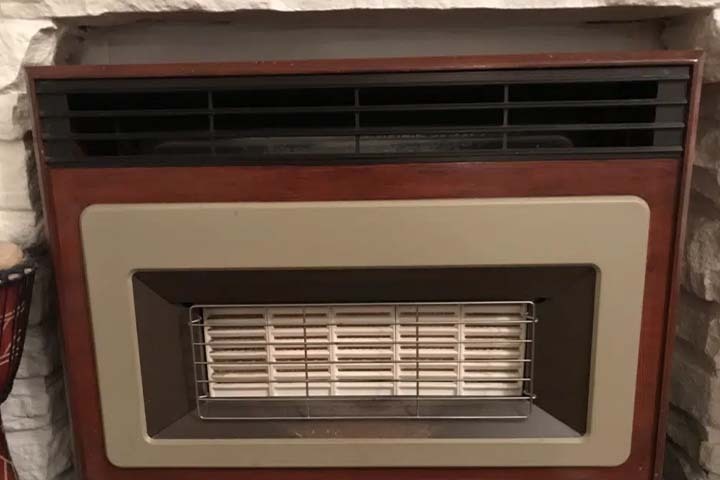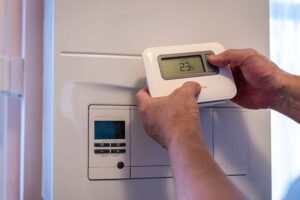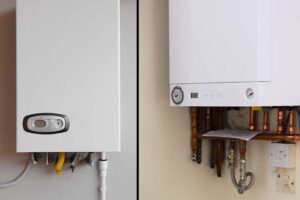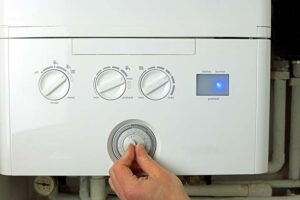Is your home still heated by a back boiler? If so, you might be entitled to a fully funded Back Boiler Removal Grant thanks to the Government’s ECO4 scheme. This grant is designed to help homeowners in England, Scotland, and Wales. So they can update their old, inefficient back boilers for modern efficient heating at no cost.
Back boilers, generally installed behind fireplaces in older homes, are very outdated, expensive to repair, and very inefficient. They cannot heat your home adequately, so most households have to turn to additional electric heaters. Thus increasing their energy bills.
This grant allows for either a new A-rated gas boiler, provided by mains gas. Or you can get a heat pump in its place to help you save money while keeping your home warm.
What are Back Boilers?
Back boilers had once been the most common form of heating homes in the UK, mainly during the 1960s, 70s, and 80s. They fitted behind fireplaces, using the heat from the fire to warm the water for central heating and hot water.
They were compact and didn’t take up much space. Therefore, they have been quite convenient for many homes.
These back boilers are not very efficient. While a modern condensing boiler can be more than 92% efficient, the efficiency of back boilers is often around only 60-70%.
That means it is necessary to use more fuel for the same amount of produced heat. Which increases energy bills accordingly.
6 Reasons You Need to Replace Your Back Boiler in 2025
Here are the reasons why you need to replace your back boiler in 2025:
1. Save Energy Bills
Back boilers waste a great deal of energy. Which means you are paying to heat your home more than you need to. A modern boiler could save you up to £320 per year on your heating costs because it uses fuel more efficiently.
2. More Heat, Less Waste
The back boilers are only 60–70% efficient because they lose 30–40% of the energy. While new condensing boilers are over 92% efficient. That means you get more heat for the same amount of fuel because less is being wasted.
3. Fewer Safety Risks
Old back boilers were not designed to meet today’s standards of safety. They develop leaks over time that can lead to dangerous carbon monoxide exposure.
And some of them have even been linked to gas explosions. Modern boilers come with features that safeguard your home and family.
4. Avoid Costly Repairs
Since they are no longer manufactured, spare parts have started to become difficult and very expensive to find. The repair of your back boiler in case any failure happens may cost hundreds or even thousands of pounds.
And that too is no guarantee it will last longer. A new system gives you peace of mind without the constant repairs.
5. Stay Up to Date with Regulations
The UK banned the installation of new back boilers since 2005 due to inefficiency and safety hazards. If one is still installed in your house, then that means your house runs on outdated technology.
An upgrade ensures not only that your heating system is modern but also an increase in your property valuation.
6. Better for the Environment
This is because back boilers use more fuel to generate the same amount of heat, which leads to an increase in emissions of carbon. Replace yours with a modern system, and you may save about 1.7 tones of CO₂ per year.
Can You Get Free Back Boiler Removal?
Yes, you can! If you still have an old back boiler, then under the ECO4 scheme, you may get a free removal grant. That means you will not have to pay for anything out of pocket to upgrade to a modern, efficient heating system.
Since back boilers are old and expensive to operate, the government encourages householders to change them. They can replace them with far safer, more efficient options like condensing boilers or heat pumps.
The grant will pay for your back boiler to be removed and a new system installed if you are eligible. This means that this will be a free upgrade to a warmer, more efficient home.
Back Boiler Removal Grants Under the ECO4 Scheme
The Back Boiler Removal Grant Gov UK is part of the ECO4 scheme, a government initiative. They help those who have low incomes or are on any benefits upgrade their heating systems for free.
Under this scheme, energy firms are required to pay for removing the old as well as ineffective back boilers and to replace them either with modern A-rated boilers or heat pumps. This can be helpful to households by:
- Save up to £320 off your heating bills per year
- Increase energy efficiency and reduce fuel wastage.
- Improve the value of your house by installing a better heating system.
Households in the whole UK could save £224.3 million every year in heating as the UK government targets under the ECO4 scheme by 2026. If you believe that you may be eligible, then now is the time to apply and enjoy a warmer, more efficient home without paying a penny.
The Boiler Upgrade Scheme
The Boiler Upgrade Scheme of the UK pays grants to house owners who replace their old boilers with newer efficient ones.
It is helping cut the UK’s carbon output and enabling houses to reduce expenses involved in heating a home, alongside the grant provided by the ECO4.
Switching to a free air source heat pump under such schemes could be a game-changer if you’re struggling with high gas and electric bills.
Back Boiler Removal Grant Eligibility
To qualify for a back boiler removal grant, you must meet the following criteria:
- Be an owner-occupier or a private tenant.
- Income: Households to have incomes below £31,000 per annum.
- Your house must be EPC-rated E, F, or G.
- Have a back boiler that is over 20 years old or a non-condensing boiler.
You may also be eligible if you receive any of the following:
- Income-based Job Seeker’s Allowance (JSA)
- Income-related Employment & Support Allowance (ESA)
- Income Support (IS)
- Working Tax Credit (WTC)
- Child Tax Credit (CTC)
- Universal Credit (UC)
- Pension Guarantee Credit
- Pension Savings Credit
Cost of Replacing a Back Boiler in 2025
Replacing a back boiler in the UK can cost anywhere in the range of £2,000 to £4,000, depending on a number of variables. The kind of boiler you select will, therefore, be very important.
Combi boilers, for instance, are popular but a little more expensive upfront. The age and condition of your property will also play a role. Older homes may need re-plumbing or pipework upgrading, adding to the overall cost.
Labour charges depend on your locality and the extent of the installation. The more complicated the job and the larger amount of work that needs to be done, the higher the charge.
How to Apply for the Back Boiler Removal Grant?
Applying for a Back Boiler Removal Grant is really easy. Check your eligibility – it takes only 60 seconds with our quick online checker. If you are eligible, we will survey your home.
And then we will recommend the best heating solution for your house, and process the whole grant application on your behalf.
This would be a fully funded boiler replacement. Once you are accepted, no upfront costs are required. We will remove your old back boiler and replace it with a new energy-efficient heating system completely free with no hassle.
Back Boiler Removal Grant Scotland
If you live in Scotland and have an old back boiler, you could be eligible for a fully funded back boiler removal grant under the ECO4 scheme.
This may be one great chance for some low-income families to have these old heating devices replaced with newer energy-efficient versions. All this without having to spend a single pound.
Your house should have an EPC rating of E to G and you should presently be on at least one kind of government benefit. A new ‘A’ rated boiler or heat pump will give you lower energy bills and efficiency in your house.
Back Boiler Removal Grant England
As part of the ECO4 grant scheme in England, the good news is that back boilers can be replaced with greener, more cost-effective heating solutions for free.
This will help a homeowner or a tenant who may be qualified due to having a house that’s hard to heat qualify for a fully funded boiler replacement.
Back Boiler Removal Grant Wales
If you are in Wales and your back boiler is still in use, then you may be entitled to a completely free replacement under the ECO4 grant.
If you’re an eligible homeowner or private tenant, this could mean a completely free upgrade for your home: removal of your old method of heating and installation of a new A-rated gas boiler or heat pump. Save money with decent heating in your warm and efficient home.
Claim Your No-Cost Back Boiler Removal Grant Today!
With the ECO4 scheme, one could get a free back boiler removal grant if they have an old back boiler. The government-backed scheme in this regard replaces old heating systems in low-income households with modern and energy-efficient systems. It does not have any installation charge.
Upgrade your old back boiler to a brand-new A-rated gas boiler or heat pump and cut energy bills accordingly. It will also ensure better heating in your home. Check your eligibility today and claim this free government grant before the scheme ends!
Frequently Asked Questions
Yes! If your home has an old back boiler, it is likely inefficient. The ECO4 scheme provides £4 billion in grants to upgrade outdated heating systems. If you qualify, you can remove your back boiler and install a new one for free.
The grants are part of the ECO4 scheme, run by Ofgem. Under the scheme, large and medium energy suppliers must fund the upgrading of heating systems. It is for low-income and vulnerable households to help them keep their homes warm.
Back boilers are also extremely outdated and less efficient. Meaning they use more fuel and cost a lot to run. A modern condensing boiler is over 92% efficient. It will help save you money on heating bills and reduce your home’s carbon footprint.
A back boiler sits behind a fireplace as an older system, while a gas boiler is a modern unit. Gas boilers are more efficient, less expensive, and greener, making them far superior in service for heating the home.







